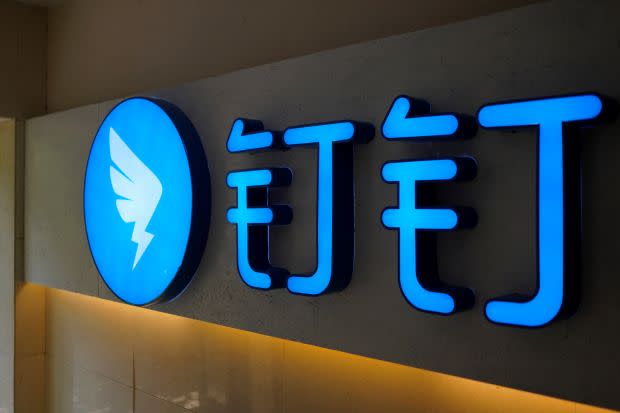What is DingTalk, Alibaba’s Slack equivalent that quarantined kids in China hate?

DingTalk is probably one of the few apps that gets bad reviews for being really good at doing its job.
The productivity app from e-commerce giant Alibaba has long had a love-and-hate relationship with Chinese employees, with one observer calling it an “Orwellian” version of Slack. In recent weeks, it’s been review bombed by its newest users, after Alibaba adapted the app for the country’s gigantic online learning experiment. Most Chinese schools and companies have been operating virtually for weeks in the wake of the Lunar New Year holiday, after coronavirus cases surged in January and Beijing put many cities under a strict quarantine.
DingTalk’s new features (link in Chinese) for schools include live-streamed classes for as many as 300 students, and online testing and grading features—more than 50 million students are now signed up to use it. Many of these students bombarded app stores with one-star reviews for DingTalk, complaining the app had ruined their extended holiday by allowing teachers to remotely monitor them. “I am really speechless, teachers require us to check in every day and gave us loads of homework,” said a user on Weibo (link in Chinese).
DingTalk saw its rating bounce back (link in Chinese) slightly this month supported by a flurry of five-star ratings, with some saying the app would train students to be good future employees.
“I can see which students have read my notices and ‘Ding’ those who haven’t easily using the app…,” said a Chinese teacher at a primary school in China. “I understand why managers like to use ‘Ding’ message—as employees we should reply to our bosses quickly anyway.”
How is DingTalk different from Slack?
Founded in 2014, the app, which is called “Ding Ding” in Chinese for the sound its messages make, is part of Alibaba’s efforts to compete with its rival Tencent, owner of messaging app WeChat, in the corporate space. While DingTalk has many of the same features as Slack, including group communications, voice and video calls, and file-sharing, DingTalk also includes a slew of monitoring features the US app doesn’t have.
The Ding message function allows managers to ping specific employees—these messages feature a blue thumbtack logo. Ding messages can be sent to employees not only in the app, but also through automated phone calls and text messages. Then, managers get read/unread status updates, making it tricky for employees not to respond if they happen to glance at a message during time off, triggering a “read” receipt. A manager at a corporate user can send up to 10,000 “Ding” messages each day within the app.
Meanwhile the app’s clock in/out function, one of its most-used features, has been described as a “digital punch card machine” by some. In the morning, it sends reminders to users about how many minutes they have left to get to work. It also keeps tabs on when employees arrive at work by logging what time they connect to the office Wifi, and when they disconnect, for example to go to lunch. While the feature also helps workers track and get paid for overtime, and is less hassle than scanning a phone code to clock in as some companies used to require, it also allows companies to measure lateness down to the minute, and whether a worker is doing what they said they’d be doing when they’re not at the office.
DingTalk has said it doesn’t allow managers to track (link in Chinese) employees’ real-time locations automatically. However, when a user enables location services, the app will tell managers if an employee was at a location they said they’d be, such as at the doctor or at a client meeting.
Apart from location-based clocking in, DingTalk also has a facial-recognition option that requires employees to smile when they scan their face to check in or out.
How many people are using the app?
DingTalk said it had 200 million individual registered users and over 10 million corporate clients as of September 2019. In comparison, Slack had 12 million daily active users as of last October.
What are the major complaints about the app?
Most of the complaints focus on how managers can use DingTalk to monitor and reach employees round-the-clock.
“I really feel DingTalk is like hell, especially when I finally have some time off and want to have a good sleep but am awakened by ‘Ding’ messages,” said a user on Zhihu, a Chinese question-and-answer website. “DingTalk is a high-tech, modern day shackle used by management to treat employees as slaves,” said another.
For many Chinese students, the app has stripped them of the already very limited freedoms they had during this unexpected time out of school. Some complained that the clock in/out function means they can’t sleep late, and have to follow the school’s schedule at home.
“Thanks to the app, the piles of homework finally came back to me again and I can see the loving faces of teachers everyday! I love it so much, my beautiful DingTalk!” wrote a student (link in Chinese) sarcastically on the app’s IOS page.
Alibaba did not immediately reply to a request for comment on the negative reviews—but DingTalk took note of the complaints and put out an apology video (link in Chinese) filled with memes and jokes, asking students to treat it more kindly.
“I know you young people don’t want to have such a ‘productive’ holiday… but please stop giving me one stars,” said the video’s narrator.
Sign up for the Quartz Daily Brief, our free daily newsletter with the world’s most important and interesting news.
More stories from Quartz:
